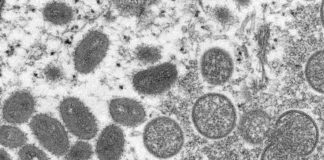There have been 2,847 doses of the Jynneos vaccine administered in Long Beach as of Monday, Aug. 22, in an effort to slow the spread of monkeypox.
Of the 2,847 doses administered in Long Beach, 1,943 were administered by the city’s Department of Health and Human Services.
The City of Long Beach reported its first presumptive case of monkeypox on July 16.
As of Aug. 23, there have been 66 probable and confirmed cases of monkeypox reported in Long Beach.
The City has created an online portal where eligible people can sign up to receive the Jynneos vaccine, which offers protection from monkeypox. The City recently switched from using an online portal to receive a Jynneos vaccine to the MyTurn system, which has been used to register for the COVID-19 vaccine throughout the pandemic.
Only people who are pre-registered on the city’s previous system can sign up for a Jynneos vaccine until Aug. 26. Starting Aug. 27 additional appointment slots will open for people who haven’t pre-registered.
The list of eligibility requirements to receive the Jynneos vaccine has recently been expanded, and now includes:
- (New) Gay or bisexuel men and transgender people who had skin-to-skin or intimate contact (e.g.,kissing, hugging) with persons at large venues or events in the past 14 days)
- (New) Persons of any gender or sexual orientation who engaged in commerical and/or transactional sex in the past 14 days (e.g., sex in exchange for money, shelter, food and other goods or needs)
- People who were exposed to someone with confirmed monkeypox and do not have symptoms.
- People who attended an event/venue where there was high risk of exposure to someone with confirmed monkeypox.
- Gay or bisexual men and transgender persons who are on HIV pre-exposure prophylaxis (PrEP).
- Gay or bisexual men and transgender people who attended saunas, bathhouses, sex clubs, circuit parties or sex parties where they had anonymous sex or sex with multiple partners.
- Gay or bisexual men and transgender people with a diagnosis of gonorrhea or early syphilis within the past 12 months.
- Gay or bisexual men and transgender people 18 years of age and older who had multiple or anonymous sex partners in the last 14 days, including engaging in survival and/or transactional sex (e.g., sex in exchange for shelter, food and other goods and needs).
- Residents who are immunocompromised, including those with advanced or uncontrolled HIV, who may be at high risk for severe disease.
While monkeypox has been disproportionately impacting members of the LGBTQ+ community, anyone can get the disease regardless of sexual orientation.
According to a statement by the City, most cases locally and nationally are contracted through skin-to-skin contact.
The risk of exposure to monkeypox may increase when engaging in any kind of sexual or intimate touching with multiple or anonymous partners (including hugging or kissing), at an event or area where there is skin-to-skin contact with multiple people, and while attending venues such as clubs, saunas, bathhouses, sex parties and curcuit parties where there is skin-to-skin or face-to-face contact with multiple people, especially if those present are wearing minimal clothing, according to the Health Department.
People who are experiencing possible symptoms of monkeypox should call their health care provider. This includes people who have:
- Traveled to an area where monkeypox cases or exposures have been reported.
- Had contact with a person who has a similar rash or received a diagnosis of confirmed or suspected monkeypox.
- Had close or intimate in-person contact with individuals in a social network experiencing monkeypox activity, this includes men who have sex with men who meet partners through an online website, digital app, or social event.
- Had contact with a dead or live wild animal or pet that is an African endemic species or used a product derived from such animals.
Those who don’t have health insurance and are experiencing symptoms can contact the City’s public health information line at 562-570-7907 for assistance.
Monkeypox usually resolves itself in two to four weeks, but more severe cases are possible.
Monkeypox is infectious and those who are infected should isolate until they’ve recovered.For more information and to keep up with the City’s response to monkeypox, visit https://longbeach.gov/health/diseases-and-condition/information-on/monkeypox/.










